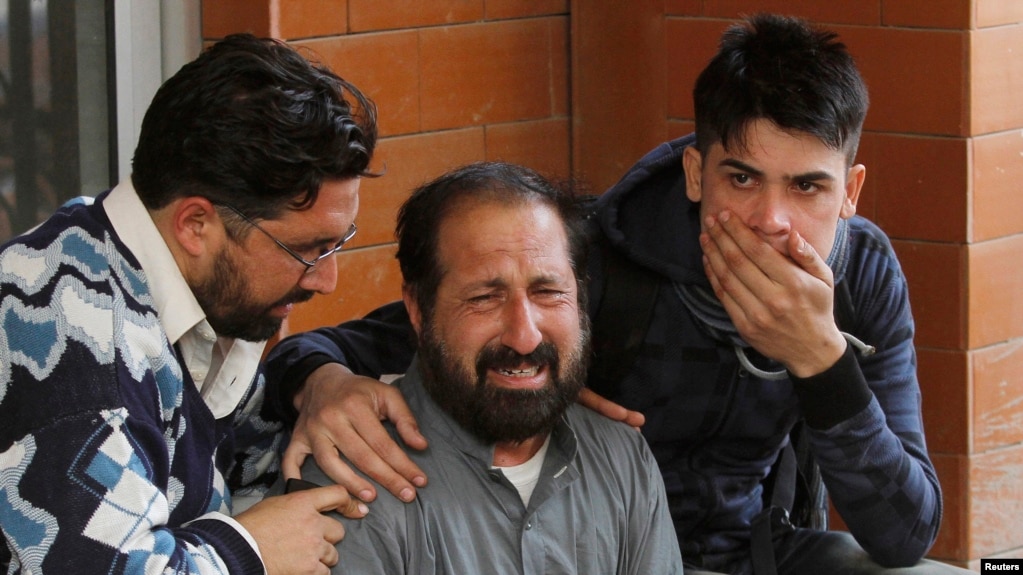
Relatives of a student who was injured during an attack by Taliban gunmen on the Army Public School comfort each other outside Lady Reading Hospital in Peshawar, Dec. 16, 2014. Image credit VOA.
by Wasama Khalid 15 December 2023
December 16 marks a somber anniversary in the history of Pakistan—the horrific terrorist attack on the Army Public School (APS) in Peshawar. On this day in 2014, innocent lives were brutally cut short, leaving an indelible mark on the nation’s collective consciousness.
It is crucial that, as a society, we pause to remember, reflect, and reaffirm our commitment to combating terrorism and fostering resilience in the face of adversity.
The APS attack was not just an assault on a school; it was an assault on the very fabric of humanity. Over 140 lives, predominantly young students and dedicated teachers, were tragically lost. Families were shattered, and a nation mourned as it grappled with the senseless brutality that unfolded within the school’s walls.
Termed as Pakistan’s equivalent of 9/11, this day serves as a poignant reminder of the nation’s unwavering resolve to confront the threat of terrorism and guarantee the security of its citizens.
The government, civil society, and the military joined forces to devise a comprehensive National Action Plan (NAP). This initiative culminated in substantial operations, including Zarb-e-Azb and Radul Fassad, designed to eradicate terrorists and fortify national security.
The commitment to eradicating extremism and fostering a secure environment for future generations became the bedrock of national policy.
Yet, even as we commemorate the progress made in the fight against terrorism, challenges persist. Pakistan continues to face threats to its national security, and it is imperative that the nation remains vigilant and adaptive in countering these evolving dangers.
Moreover, it is essential to acknowledge the global context of terrorism and its interconnected nature. Pakistan has been consistent in asserting that it is not immune to external influences.
The response was not merely one of sorrow but also a collective call for action against the forces of terror that sought to undermine the values of peace, education, and progress.
Despite the global pervasiveness of terrorism, Pakistan stands out as one of its most profoundly affected victims. Enduring a sacrifice exceeding 70,000 lives and incurring an economic toll surpassing $150 billion, the nation remains resolute in its determination to eliminate this peril.
Several waves of terrorism have surged across major cities in Pakistan, with Peshawar experiencing the most profound impact, notably marked by the APS attack as the city’s most catastrophic incident in history.
Pakistan has consistently asserted that India serves as a sponsor of terrorism within its borders, substantiating these claims with a meticulously compiled dossier that includes specific details such as bank accounts and the active participation of Indian nationals. The dossier has also elucidated the locations of training camps affiliated with groups like Tehreek-e-Taliban Pakistan (TTP) and Baloch insurgents.
A security analyst contends that India’s intelligence agency, RAW, allocated $1 million to amalgamate TTP with four other terrorist entities, facilitating acts of terrorism within Pakistan. The analyst further posits that India has been channeling funds to Baloch separatists and activists through various conduits, including Afghan think tanks.
Pakistan’s government has consistently exposed India for its role in orchestrating terror attacks aimed at disrupting the China-Pakistan Economic Corridor (CPEC), with RAW making substantial investments in diverse militant groups for this purpose.
The architect behind the APS attack was Mullah Fazal Ullah, with collaborators such as Gul Zaman Orakzai, Omar Narai, and Muhammad Khurasani maintaining communication with handlers from RAW and Afghanistan’s National Directorate of Security (NDS).
On this commemorative anniversary, the nation, inclusive of its leadership and civil society, pays homage to the martyred children and teachers, recognizing their profound sacrifices. This day reaffirms the country’s unwavering stance against terrorism, reiterating a plea for the interim Afghan government to take decisive action against terrorist organizations, including TTP, and to curtail the misuse of Afghan territory against Pakistan.
As the nation reflects on the APS attack, it underscores a resolute message that terrorism will not impede its steadfast commitment to peace and security.
The nation has presented detailed dossiers highlighting India’s alleged sponsorship of terrorism on Pakistani soil, emphasizing the involvement of Indian nationals and the support provided to groups like Tehreek-e-Taliban Pakistan (TTP) and Baloch insurgents.
As we remember the victims of the APS attack, we must renew our commitment to fighting terrorism in all its forms. This includes addressing not only the domestic roots of extremism but also advocating for international cooperation in dismantling transnational terrorist networks.
In commemorating the APS tragedy, we must strive for a Pakistan where education triumphs over ignorance, unity prevails over division, and resilience conquers adversity. Only through collective determination and a commitment to shared values can we ensure that the sacrifices of December 16, 2014, serve as a catalyst for lasting change.
